Effects of a Herb Usage Health Literacy Program on Health Literacy and Health Behavior in Persons with Chronic Kidney Disease Stage 3-4
Main Article Content
Abstract
This Randomized Controlled Trial (RCT) aimed to examine the effects of a herb usage health literacy program on health literacy and health behavior in persons with chronic kidney disease stage 3-4. The study participants were randomly assigned into two groups, each consisting of 30 participants. The control group received usual nursing care, while the experimental group received usual nursing care and the 8 weeks health literacy program. The program consisted of conversations, information sharing, video clips, and 9 sets of questions that promote health literacy, through the individual LINE application. Data were assessed before and after the experiment using questionnaires related to the herb usage health literacy and health behavior of persons with chronic kidney disease. Both instruments were examined for content validity yielding a similar value of 0.91 and for reliability of the scale yielding a similar Cronbach’ alpha coefficient of 0.94. Data were analyzed using descriptive statistics, Chi-square test, Fisher's exact test and t-test. The result showed that at the end, the experimental group had a higher mean score health literacy and health behavior than the control group (p<.01). The mean score of health literacy and health behavior in the experimental group after receiving the program was statistically higher than at the starting point (p<.01). This implies that the herb usage health literacy program should be applied by integration with the usual care for persons with chronic kidney disease to improve their health literacy and ability to use an appropriate herb.
Downloads
Article Details

This work is licensed under a Creative Commons Attribution-NonCommercial-NoDerivatives 4.0 International License.
References
Shlipak MG, Tummalapalli SL, Boulware LE, Grams ME, Ix JH, Jha V, et al. The case for early identification and intervention of chronic kidney disease: conclusions from a Kidney disease: improving global outcomes (KDIGO) controversies conference. Kidney Int 2021; 99(1):34-47.
The nephrology society of Thailand. annual report. Thailand renal replacement therapy [Internet]. [cited 2021 August 1]. Available from: https://www.nephrothai.org/annual-report-thailand-renal-replacement-therapy. (In Thai)
Ministry of public health. Service plan chronic kidney disease. [Internet]. [cited 2021 July 28]. Available from: https://hdcservice.moph.go.th/hdc/main/index_pk.php. (In Thai)
Yangtalad Hospital. Medical record. [Internet]. [cited 2021 July 28]. Available from: https://yth.go.th/ythweb. (In Thai)
Kidney disease improving global outcomes. KDIGO 2012 clinical practice guideline for the evaluation and management of chronic kidney disease. Kidney Int Suppl 2013; 3: 5-14.
Alanizy L, Almatham K, Basheer AA, Alfayyad I. Complementary and alternative medicine practice among saudi patients with chronic kidney disease: a cross-sectional study. Int J Nephrol Renovasc Dis 2020; 13: 11-8.
Silarak T, Piyabunditkul L, Kittipichai W. Predictive factors of chronic kidney diseasein patients with diabetes mellitus at Sisaket province. Songklanagarind Journal of Nursing 2020;40(2):109-21. (In Thai)
Konkaew P and Suphunnakul P. Risk behaviors of chronic kidney disease: perspectives of patients with chronic kidney disease. Thai Journal of Public Health 2019;49(3):314-24. (In Thai)
Mohammadi S, Asghari G, Emami‑Naini A, Mansourian M, Badri S. Herbal Supplement Use and herb-drug interactions among patients with kidney disease. J Res Pharm Pract 2020;9(2):61-7.
Sri Laasya TP, Thakur S, Poduri R, Joshi G. Current insights toward kidney injury:decrypting the dual role and mechanism involved of herbal drugs in inducing kidney injury and its treatment. Current Research in Biotechnology 2020; 2: 161-75.
Hsieh CF, Huang SL, Chen CL, Chen WT, Chang HC, Wu ML, et al. Increased risk of chronic kidney disease among users of non-prescribed Chinese herbal medicine in Taiwan. Prev Med 2012;55(2):155-9.
Nutbeam, D. Defining and measuring health literacy: what can we learn from literacy studies. Int J Environ Res Public Health 2009;54:303–5.
Janthapuek J, Chopsiang L. Relationships between health literacy and self-care behaviors to delay the progression of chronic kidney disease among patients with chronic kidney disease stages1 and 2. Regional Health Promotion Center 9 Journal 2020;14(34):243-58. (In Thai)
Chen YC, Chang, L, Liu C, Ho Y, Weng S, Tsai T. The roles of social support and health literacy in self-management among patients with chronic kidney disease. J Nurs Scholarsh 2018;50(3):265-75
Bunklai K, Kanoksuntonrat N, Phinitkhonjorndech N. Relationship between health literacy, self care behaviors and glomerular filtration rate among patients with chronic kidney disease stage 3-4. Boromarajonani College of Nursing, Uttaradit Journal 2020;12:225-39. (In Thai)
Nutbeam D. Health literacy as public health goal:Challenge for contemporary health education and communication strategies into the 21st century. Health Promot Int 2000;15(3):259-67.
Saedkong P, Potchana R, Wayo W, Klungklang R. Effects of using Hugtai application on health literacy among patients with diabetes type 2, hypertension, and chronic kidney disease stage 3 at Wat Nong Weang Pra-aramluarg parimary care unit in Khon Kaen. The Southern College Network Journal of Nursing and Public Health 2020;7(3):195-206. (In Thai)
Health education division. health literacy assessment form and health behaviors [Internet]. [cited 2021 July 20]. Available from: http://www.hed.go.th/linkHed/index. (In Thai)
Norasing M, Thanomphan S. Health literacy and health behavior in patients with uncontrolled blood sugar level or blood pressure: a case study of Nakornping hospital. Journal of Nakornping Hospital 2019;10(1):35-50. (In Thai)
Wanprasert S, Moolsart S, Jantacumma N. The effectiveness of a health literacy developmental program in a pre-hypertension group with overweight. Journal of Nursing, Public Health and Education 2019;20(2):92-104. (In Thai)
Bahrami, M, Behbahani MA. The effect of a health literacy promotion program on the level of health literacy and death anxiety in women with breast cancer. Iran J Nurs Midwifery Res 2019;24(4):286-90.
Uemura, K, Yamada M, Okamoto H. The effectiveness of an active learning program in promoting a healthy lifestyle among older adults with low health literacy: a randomized controlled trial. J Diabetes Investig 2021;67:25–3.
Kongsa A, Boonyamalik P, Kerdmongkol P. Effects of health literacy promoting program on blood pressure control behaviors among elderly with hypertension. Kuakarun Journal of Nursing 2020;27(2):90-102. (In Thai)
Begley A, Paynter E, Butcher LM, Dhaliwal SS. Effectiveness of an adult food literacy program. Nutrients 2019;11(797):1-15.


